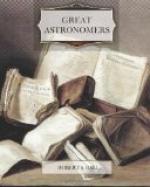Sir Jonas Moore, one of the influential friends whom Flamsteed’s talents had attracted, seems to have procured for him the position of king’s astronomer, with a salary of 100 pounds per annum. A larger salary appears to have been designed at first for this office, which was now being newly created, but as Flamsteed was resolved on taking holy orders, a lesser salary was in his case deemed sufficient. The building of the observatory, in which the first Astronomer Royal was to be installed, seems to have been brought about, or, at all events, its progress was accelerated, in a somewhat curious manner.
A Frenchman, named Le Sieur de S. Pierre, came over to London to promulgate a scheme for discovering longitudes, then a question of much importance. He brought with him introductions to distinguished people, and his mission attracted a great deal of attention. The proposals which he made came under Flamsteed’s notice, who pointed out that the Frenchman’s projects were quite inapplicable in the present state of astronomical science, inasmuch as the places of the stars were not known with the degree of accuracy which would be necessary if such methods were to be rendered available. Flamsteed then goes on to say:—“I heard no more of the Frenchman after this; but was told that my letters had been shown King Charles. He was startled at the assertion of the fixed stars’ places being false in the catalogue, and said, with some vehemence, he must have them anew observed, examined, and corrected, for the use of his seamen.”
The first question to be settled was the site for the new observatory. Hyde Park and Chelsea College were both mentioned as suitable localities, but, at Sir Christopher Wren’s suggestion, Greenwich Hill was finally resolved upon. The king made a grant of five hundred pounds of money. He gave bricks from Tilbury Fort, while materials, in the shape of wood, iron, and lead, were available from a gatehouse demolished in the Tower. The king also promised whatever further material aid might be shown to be necessary. The first stone of the Royal Observatory was laid on August 10th, 1675, and within a few years a building was erected in which the art of modern practical astronomy was to be created. Flamsteed strove with extraordinary diligence, and in spite of many difficulties, to obtain a due provision of astronomical instruments, and to arrange for the carrying on of his observations. Notwithstanding the king’s promises, the astronomer was, however, but scantily provided with means, and he had no assistants to help him in his work. It follows that all the observations, as well as the reductions, and, indeed, all the incidental work of the observatory, had to be carried on by himself alone. Flamsteed, as we have seen, had, however, many staunch friends. Sir Jonas Moore in particular at all times rendered him most valuable assistance, and encouraged him by the warm sympathy and keen interest which he showed in astronomy. The work of the first Astronomer Royal was frequently interrupted by recurrent attacks of the complaints to which we have already referred. He says himself that “his distempers stick so close that that he cannot remove them,” and he lost much time by prostration from headaches, as well as from more serious affections.




